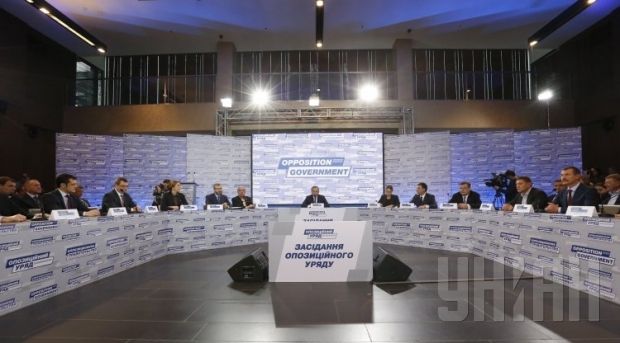
Opposition Bloc retreats into the shadows
On the last day of March, the remnants of the Party of Regions, or the Opposition Bloc in Ukraine’s parliament, formed a shadow cabinet. But this collection of political has-beens doesn't look any different from previous shadow governments. UNIAN visited the event marking their retreat into the shadows.
Despite the fact that the British - the ancestors of parliamentarianism – initially called the government created in official opposition to Her Majesty's government a Shadow Cabinet, Ukrainian politicians don’t like this phrase and keep avoiding it. Due to its mentality Ukrainian political elite rejects the term “shadow government.” The reason is it may evoke something negative with the electorate. As if people wouldn’t understand. But how can one misunderstand the desire of the opposition to work in the “shadows” rather than be a “shadow” of the current government?
It is in a faraway Britain where ministers of a Shadow Cabinet specialize in monitoring specific offices of the official government as if they are shadows of acting ministers. In civilized countries a shadow government gives an opportunity for the opposition to prepare its ministers to gain posts if they win the elections. In democratic states with a parliamentary form of government shadow ministers are potential (and most likely) candidates to replace their opponents.
In Ukraine, a "shadow" government (whatever you call it – an "opposition" or even "alternative" cabinet) is associated not with alternatives to reform the government or any constructive criticism of such, but rather with mere populism
For example, is there anyone who remembers any achievements of Pavlo Lazarenko’s shadow government in 1997, the first one ever since Ukraine gained independence? Or were there any reformist ideas to be remembered from Viktor Yanukovychs’ first shadow cabinet as of 2005, except for a 15-minute addresses with hackneyed sloganeering for the press and “sessions” behind closed doors; or his second one as of 2007, which failed to organize any more than two dozen meetings in over two years? Or was there any point in the work of the shadow government of Yulia Tymoshenko, hammered together in 2010, from her own fraction’s deputies and led by Serhiy Sobolev (Tymoshenko herself, deprived of the official premiership, was not able to preside over an alternative cabinet), except for truancy and tedious criticism of the authorities without its own proposals for the country’s development? What can we say about one of the last shadow governments, formed by the Svoboda Party in 2013 in defiance of both Azarov’s official government and Sobolev’s unofficial cabinet (everyone seemed to have forgotten of its existence by that time)?
Old traditions
With this in mind, there was no hope that this widely publicized shadow government of Boris Kolesnikov will change this dismal trend of Ukrainian opposition Cabinets. And the first ceremonial meeting on March 31, where new self-assured ministers were presented to the press, “did not disappoint.”
Instead of the usual “place of pilgrimage” for the former Party of Regions - Capital Hotel Intercontinental - the rather untraditional Hall of Champions at the National Staduim “Olympiyskiy” was chosen for this “significant” event for the Ukrainian opposition. The hall hosted anyone but champions. While the press and some former prominent figures who, for various reasons, had not managed to get into the parliament of the eighth convocation chatted in the “session” hall, shadow ministers headed by the shadow PM gathered in another room. And it was impossible to catch any of them at the main entrance. Also, in best traditions of the previous government, no briefings were scheduled. “All materials and presentations will be available on the Web site of the Opposition Bloc,” its press service said.
A few minutes after noon, as had been announced, the Opposition Cabinet was shown to the public. The head of the Opposition Bloc in parliament, Yuriy Boyko, announced that the “shadow government is an important part of the opposition movement.” “We believe that it will play an important role in allowing society to know the truth, [and] it will present alternative solutions to the current government’s decisions,” he said.
Actually, one of the key objectives of the shadow cabinet, according to Boyko, will be drafting bills that the opposition bloc will subsequently submit to the parliament. It should be noted that voters in their traditional electoral fiefdom – the Donbas - are not really happy with the current legislative initiatives of ex-members of the Party of Regions. The self-proclaimed leaders of the Donetsk People’s Republic (DPR) vocally criticize their former masters, suspecting them of conspiracy with the Ukraine’s President Petro Poroshenko on the issue of local elections in eastern Ukraine...
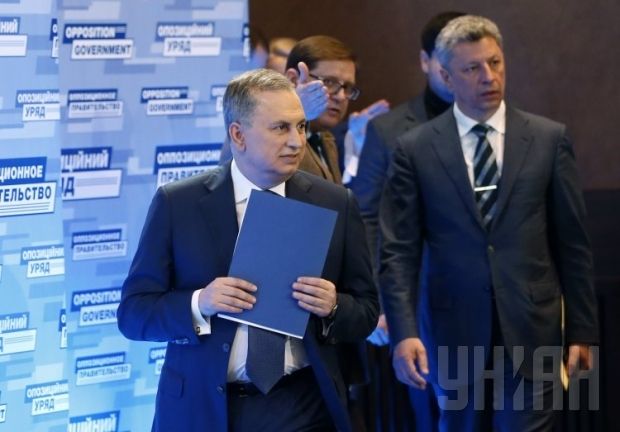
Shadow Prime Minister Borys Kolesnikov began his speech by saying right off the bat that the opposition government will begin its work with an analysis of mistakes made by the current government. And then he immediately announced two major issues requiring immediate correction - unemployment and the devaluation of the national currency.
Although promising not only to criticize the government, but also to “give constructive suggestions for resolving problems,” the shadow PM actually mainly confined himself to criticism. He said that “for the past ten years,” governments gave zero performance, and the fact that the team of the newly established Shadow Cabinet was, itself, repeatedly in power over these ten years, didn’t faze Kolesnikov at all. “Members of the opposition government know the price of success - they have gained it numerous times, in politics, business and sports,” he said.
'Successful' ministers of the shadow cabinet
Well, indeed - the alternative government’s composition lacks new faces. Shadow PM Kolesnikov was repeatedly elected as an MP, and as a member of the Party of Regions he used to preside over the Parliamentary Committee on Transport and Communications, was a Deputy Prime Minister of Infrastructure in the Mykola Azarov’s government, and, after the defection of Viktor Yanukovych, he became the de facto leader of the Party of Regions, officially presiding over the party’s political council. According to some reports, Kolesnikov wrote a letter of withdrawal from the Party of Regions after he was appointed shadow PM.
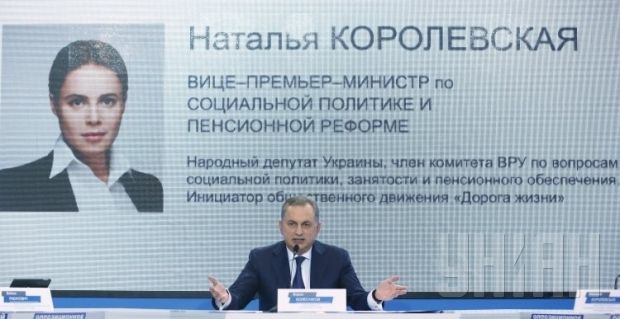
Shadow Deputy Prime Minister for Social Policy and pension reform Nataliya Korolevska said that “the country, able to build space rockets, planes and ships” must unite in efforts “to win the war against poverty.” She is also remembered as an MP from the Bloc of Yulia Tymoshenko of two parliament’s convocations, the leader of the party “Ukraina-Vpered!” having a pipe dream as a Minister of Social Policy in Mykola Azarov’s Cabinet - promising voters pensions of up to EUR 500...
By the way, Mykhaylo Papiyev, ex-minister of labor and social protection in the Cabinet of Yanukovych in 2006-2007, who is the shadow minister for social security and who was a shadow Minister for Social Policy in the second shadow government of Yanukovych, will help Korolevskaya in building up shadow social policies. During Yanukovych’s presidency, Papiev was the chief of the Chernivtsi Regional State Administration, which resulted in him currently being accused of “hindering the implementation of voting rights during the election campaign of 2012.” Criminal proceedings against him are continuing.
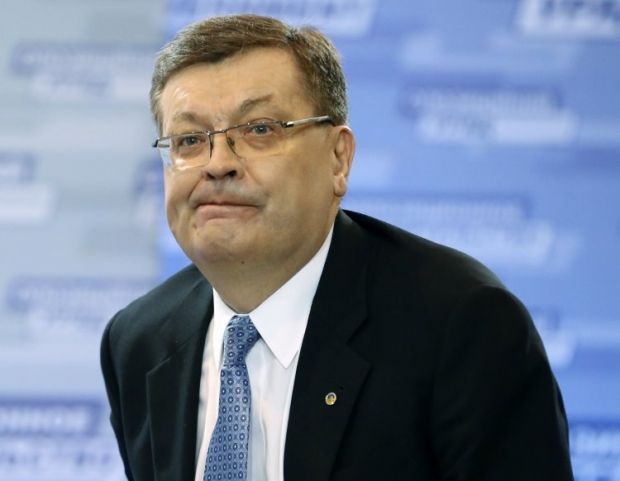
Kostyantyn Hryshchenko, appointed as shadow foreign minister, is also familiar with working in a shadow cabinet. Actually, he already fulfilled this mission in the second alternative government of Viktor Yanukovych. In addition, he officially headed the Ukrainian Foreign Ministry twice and was Deputy Prime Minister in Azarov’s Cabinet. However, the Ukrainians probably remember him mostly with regard to European Association failure by Yanukovych in 2013...
Also, the newly appointed shadow minister of fuel and energy complex Volodymyr Makukha can be linked to the old associates of Viktor Yanukovych. The last time he was prominent in politics was nearly ten years ago when he served as Minister of Economy of Ukraine in the second government of Yanukovych, and in 2007, he was appointed Deputy Minister of Fuel and Energy of Ukraine. Prior to that, Makukha has been working on the foreign policy front, as economic adviser to the Ukrainian Embassy in the United States, head of economic cooperation department of Ukraine’s Foreign Ministry, Deputy Minister of Foreign Affairs, the Ambassador of Ukraine to Japan...
Alexander Vilkul, Deputy Prime Minister for industrialization and restoration of the Donbass is also an official quite familiar to Ukrainians. Over the past year he had a little too many media appearances, unsuccessfully trying to disown his cooperation with the regime of Yanukovych. The interesting thing is, that intending to surf the wave of recovering the Donbas, Vilkul offers Ukraine to share this mission with him, “Today the restoration of Donbas is the problem of the whole country,” being “too modest” not to mention the other side of the conflict... In this regard, it is also rather interesting that there is no shadow minister of defense in this shadow government.
Another representative of the “old boys” Mykhaylo Dobkin, who was absent at the first meeting of the newly established alternative cabinet, was appointed to reform local government (as a shadow Deputy Prime Minister). Indeed, is there anyone else to entrust working with local authorities but a person who tried organize some “Ukrainian Southeastern Front” after Yanukovych fled, a person who earlier was an active participant of a separatist congress in Severodonetsk?
New old faces
However, the appointment of Vadym Rabinovych, MP from the opposition bloc, as a shadow Deputy Prime Minister for monitoring law enforcement agencies, also looks surprising. He asked for this position himself, saying that he would create an effective shadow committee to combat corruption. It seems like Kostyantyn Stogniy, a shadow minister of internal affairs and emergency situations who is now hosting “Extreme news” on ICTV channel, is to help him with this.
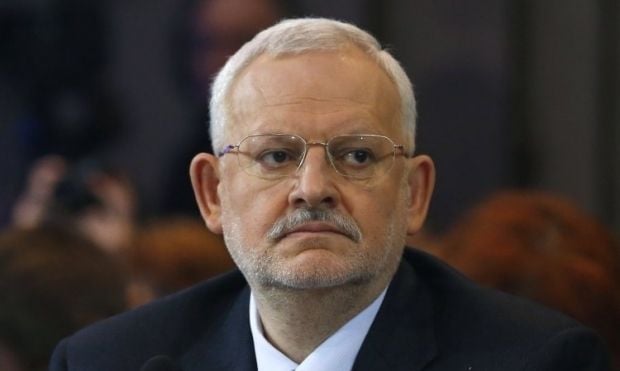
As for the other, less odious shadow ministers, Ihor Shurma, ex-deputy of former Kharkiv mayor Mykhaylo Dobkin will be responsible for health issues; former adviser to ex-Prime Minister Anatoliy Kinakh and former staff member for the Razumkov Center Viktor Skarshevsky will be responsible for finance field; and Yevgeny Murayev, MP, ex-member of the Party of Regions, supporter of separatism and federalization will lead the shadow ministry for economy and trade. Yury Kotliarov, lawyer, ex-head of the legal department of Ukrtelecom was appointed a shadow minister of justice; Pavlo Zhyla, ex-chief of Ukraine’s State Ecology Inspection became shadow minister of ecology. Vladimir Shemaev was appointed shadow minister for infrastructure and transport. He is known in narrow circles as an expert on transport infrastructure, but his links with politics started developing during the parliamentary race in 2014 when he, as a chairman of all-Ukrainian youth public organization “Student Platform,” led the Left Alliance Bloc (then it came under the patronage of the odious Mykola Rudkivsky, and the party funding, according to media reports, fell on the shoulders of structures controlled by Rinat Akhmetov). By the way, the shadow minister for education, culture and science Yelena Kolesnikova is also associated with Akhmetov. In turn, the shadow minister of agriculture of Mykola Shishman is also unknown to the general public. According to some reports, he is a protege of Akhmetov, being the head of the company “Ilyich-Agro Kiev” - one of the subsidiaries of the enterprises of PJSC “Illych Steel and Metal Works” in Mariupol.
Ambitious plans with the odour of populism
Besides the already mentioned “reforms” and the fight against unemployment, the devaluation of the hryvnia and the work on the restoration of the Donbas, the shadow government, according to Kolesnikov, will draft “strategically important bills” in the field of national security and constitutional reform. “The constitution should give a new impetus to economic growth...” he said, promising that a quality draft of the new Constitution will be submitted by the opposition in May of this year.
In this regard, it is interesting that that the Opposition Bloc did not participate in forming the Constitutional Commission under the President of Ukraine, which is to be engaged in drafting amendments to the country’s Constitution.
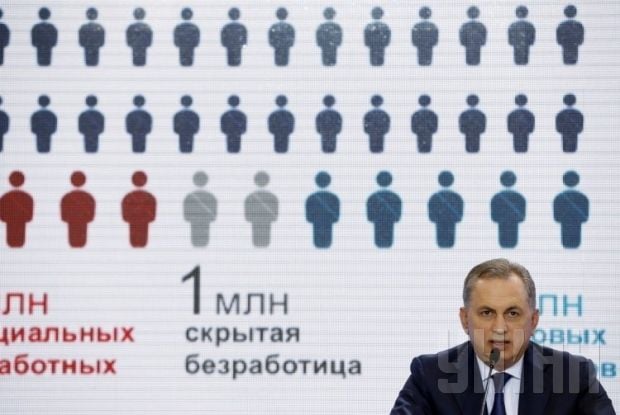
As for the other key issues, Kolesnikov admitted that his shadow government does not have a program yet, and it will be published no earlier than mid-April.
Anyway, judging by the first shadow meeting of the shadow government, it is unlikely that it will be radically different from the previous opposition cabinets, and its creation had several objectives. First, to change the status of truants among opposition deputies in Ukraine’s parliament, of the defendants or witnesses in criminal cases involving the crimes of the Yanukovych regime, to one of a shadow government. Second, to prepare for future local elections and to sap the ratings of politicians from the current government, playing on public dissatisfaction and voicing populist slogans.

